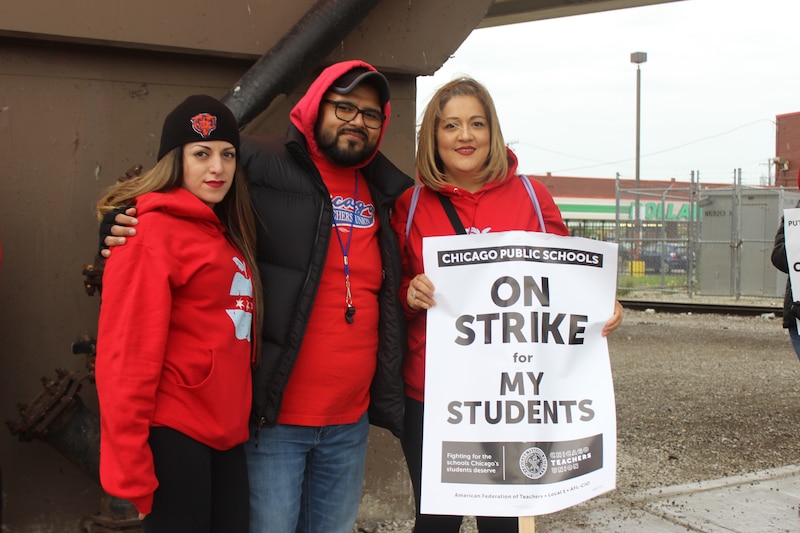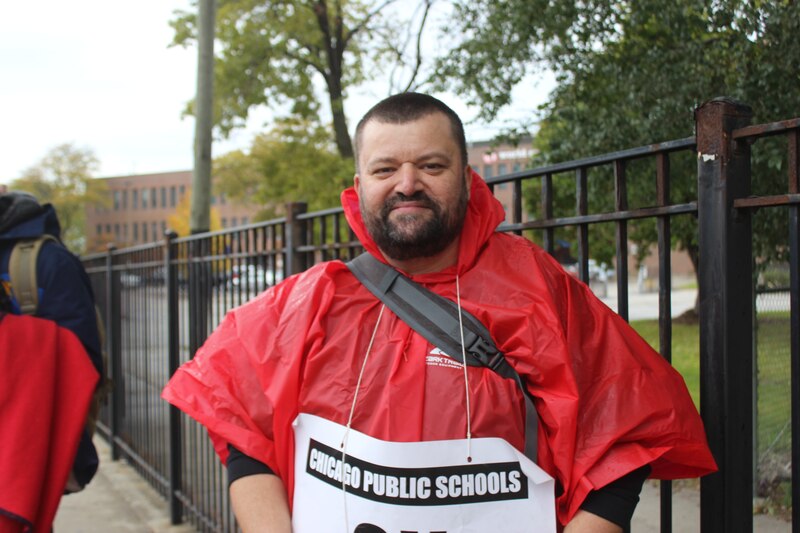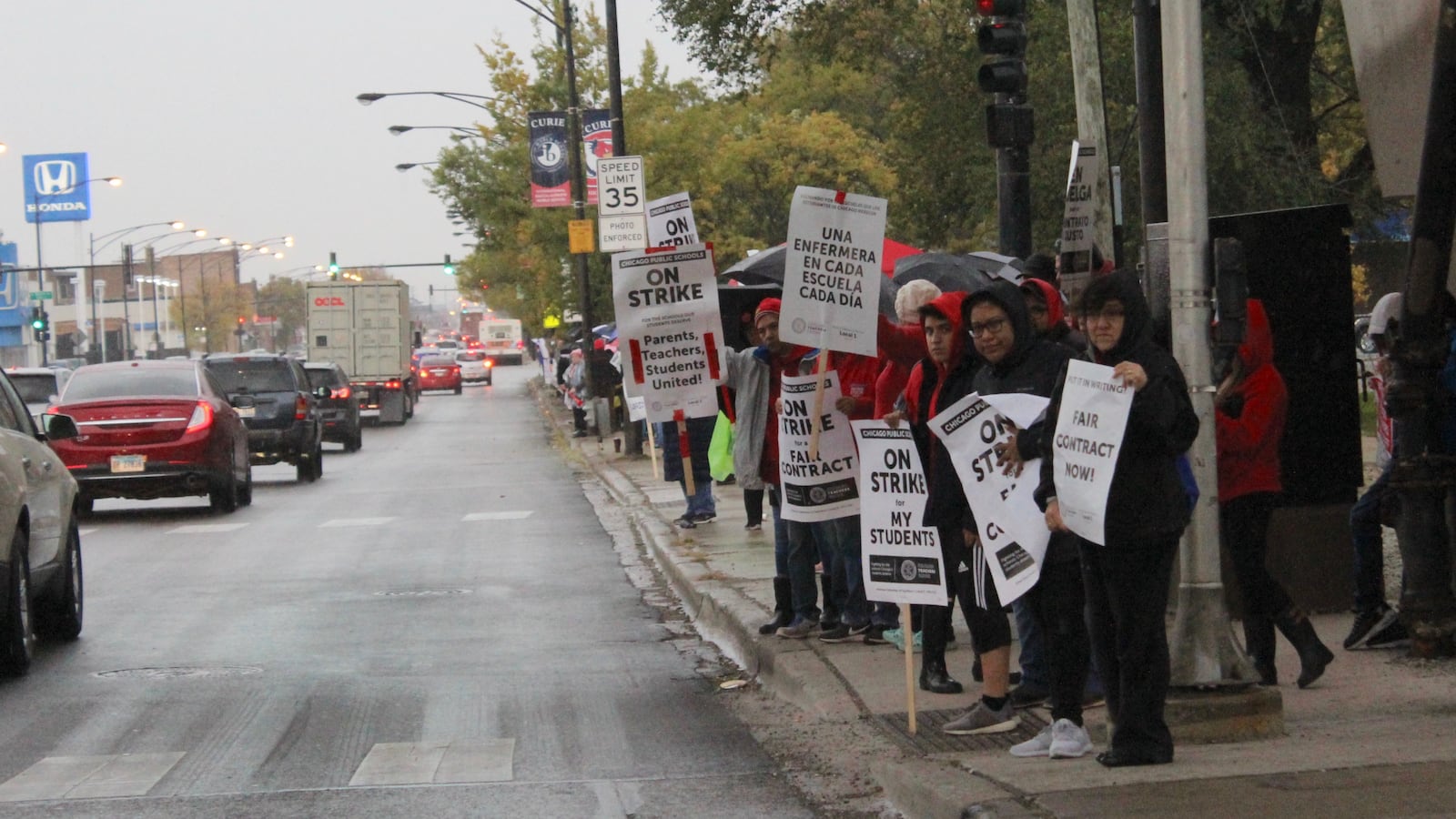Monday dawned with no deal, no school, and rain in the forecast. Striking Chicago teachers planned picket lines at schools in the morning — including a South Side picket line they said would stretch for seven miles. An afternoon rally was set to start at 2 p.m. at Union Park and include support staff from Service Employees International Union 73.
Mayor Lori Lightfoot’s schedule for Monday put her on the West Side announcing a “groundbreaking initiative” with a bank CEO, not in teachers union talks.
We’ll be providing updates throughout the day from picket lines, negotiations, and public appearances by the mayor and union officials. Stay tuned!
7:35 p.m. Talks sour
After another day of bargaining, a large team of union members emerge from Malcolm X and say that any hopes of a quick settlement are “dashed.”
“Unless there’s a change at the top of the city in regards to their willingness to make meaningful changes, we’re not likely seeing a quick settlement to the current strike,” says union President Jesse Sharkey. We will post a full update soon.
6:30 p.m. Worries about fallout
Even as parents scrambled to arrange child care and older students rallied to support their teachers, both adults and teens alike expressed concern about the lasting impact of losing several days of school.
“It takes a month to get kids acclimated after summer break, and now we have to start all over,” parent Julie Garner told Ariel. “And teachers are already cramming everything in as it is. Tomorrow is Day Four — that’s a lot of time when it comes to school.”
Ariel reports from Marwen youth center near Cabrini-Green, a Voices of Youth in Chicago Education rally, and a Raise Chicago Coalition gathering at City Hall to demand a $15 minimum wage for youth labor.
4 p.m. It’s official: No school Tuesday
3:40 p.m. A special education view
It’s clear that some of the teachers union’s demands would help students with disabilities — such as the call for more nurses. We just published a new First Person piece from the mother of a 12th-grader with special needs who says that many other contract demands would also make a difference for her son, from the call for more librarians to the push for enforceable class size limits.
“When my son was in first grade, the school was overcrowded so they decided to convert the Resource Room into a regular classroom,” writes Catherine Henchek. “As a result, students with disabilities like my son had to do their lessons in the supply closet.”
3:10 p.m. A Springfield target
Monday is still trucking along but we just got a press release about a protest scheduled for Tuesday, at the Chicago office of Illinois Sen. John Cullerton. As the state senate president, Cullerton calls the shots on which bills advance, and the union says he has stopped legislation that would have helped Chicago teachers and students.
“Senate President Cullerton has prevented numerous bills for educational equity from being passed,” the release says “He needs to take accountability for his role in the current CPS strike.”
The release notes two bills specifically: one that would have created an elected school board in Chicago, and another that would have given teachers the legal right to bargain on non-compensation issues. While there are dozens of issues at play in the current negotiations, only the impasses on pay and benefits are legally allowed to hold up a final resolution.
2:40 p.m. Paul Vallas pipes up
One of the many people who lost out to Lori Lightfoot in this year’s race for Chicago mayor has weighed in on the strike — in a way that’s entirely consistent with his approach as fiscally conservative mayoral candidate.
Paul Vallas, a former schools CEO, argues in Crain’s Chicago Business that the new revenue from the state that union leaders say can fund their demands is uncertain.
What happens if the state’s budget—which is dependent on continued robust economic growth, unreliable new casino revenues, unproven new revenue sources like sports betting and cannabis sales and voter approval of a constitutional amendment allowing for a progressive income tax increase—does not realize the revenue needed to sustain a dramatic increase in program spending and fully fund the new school aid formula? This doesn’t even factor in the continued growth in the state’s long-term pension obligations that the state has yet to address. If the state is forced to freeze or even cut spending, will teachers agree to postpone their pay and automatic step increases to avoid layoffs and further school closings?
2:10 p.m. A mounting price tag
The city has put some of the union’s key demands in writing but cannot afford its full requests, an exasperated Mayor Lori Lightfoot said during a press conference this afternoon.
With negotiations still ongoing, the city said it has promised to place one nurse and one social worker in every Chicago school within the next five years, with highest-need schools prioritized, to meet one of the union’s key demands, an increase in school support staff. But that contract provision would push up the total cost of the city’s proposal by hundreds of millions of dollars, Lightfoot said Monday.
How that will be funded remains unclear. The mayor said she won’t be taking any money from the controversial Lincoln Yards development project, and that the city will only sign a deal that it can pay for.
“What we have announced is something CPS can afford and achieve,” Lightfoot said at a Boys and Girls Club where some students out of school during the strike were spending the day.
Earlier on Monday, the mayor announced a new initiative, Invest South West, that would pump $175 million in city funds over three years into a handful of neighborhoods on Chicago’s South and West side.
1 p.m. Class size, support staff, teacher pay … school sports?
Dozens of issues have surfaced in contract talks beyond the five that union officials have said will make or break an eventual deal (class size, support staffing, teacher prep time, pay and benefits, and contract length, if you’re keeping track).
Today a new one took central stage at a midday union press conference: school sports. The union said Monday that it had put forth a proposal for stipends for coaches, more money for facilities and equipment, and transportation to and from practices and games for players. It sent several teachers who also work as coaches to update reporters before their availability was cut short by an angry heckler.
Brad Dowling, a boys basketball coach at Steinmetz High School on the city’s Northwest Side, said his coaching staff turned over every year because of the demands of the job combined with low pay. “A freshman high school coach, after taxes, makes $1,000 a year, and they are spending four months of their lives, including weekends, at practices and games,” he said. “People with families have limits.”
Ken Clark, who coaches golf at Lindblom High School, said that without district-provided transportation, participation is effectively limited to students whose families can get them to tournaments outside the city. And other coaches described old and worn-down equipment, athletic fields that are in disrepair or filled with trash or unlit at night, and a revolving door of volunteers. “School athletic programs have the potential to change kids’ lives if they had the facilities to do so,” said a coach from Taft High School.
High school soccer and tennis players were shut out of a state tournament this weekend because of the teacher strike.
12:40 p.m. A hard no from the union
The Chicago Teachers Union may have mocked the city’s request for teachers to go back to work while bargaining continued, but we wanted to make sure that was the same as saying no.
Alison Eichorn, a teacher and coach at Lindblom High School who’s on the union’s negotiating team, offered a response during this afternoon’s union briefing. It was clear as day.
“That’s not going to happen,” Eichorn said. “I don’t know if the mayor is familiar with what unions do, but we’ve gotten more tentative agreements in two days than we’ve gotten in 10 months.”
11:53 a.m. City asks union to end strike without a deal
Mayor Lori Lightfoot and Chicago Public Schools CEO Janice Jackson have asked the Chicago Teachers Union to call off the strike — without a deal.
“The students and families of Chicago cannot afford to be out of school for any longer,” Lightfoot and Jackson wrote in a letter to union officials Monday. “We are asking you to end the strike and encourage your members to return to work while bargaining continues.”
The letter emphasizes that families are feeling the strain of finding child care, seniors applying to college are worrying about their applications, and student athletes are forfeiting championship matches. Most importantly, the letter says, “our students’ safety and access to healthy food are far more at risk without the structure of a full school day.”
The union published the letter on Twitter with a dismissive note: “Can someone let @ChicagosMayor know when said ‘put it in writing,’ this isn’t what we meant.”
11:03 a.m. Calling Jesse Jackson
The Chicago Teachers Union says it has asked the Rev. Jesse Jackson to help negotiate with City Hall — and that the city resident and frequent bridge-builder has agreed.
“Every student in the city of Chicago should have access to great local public schools, and places that are safe, welcoming and meet their social and emotional needs. For that dream to become a reality, it will require that all parties come to the table with fairness, justice and equity in mind,” Jackson said in a union press release. “While understanding the budget concerns being made by the mayor, I’m also very sensitive to the voices of educators, who are often the ones on the day to day front lines with the students.
“I pray that my voice at the table will be the catalyst necessary for a fair and equitable deal to be reached.”
Jackson attended one bargaining session last week. He also played a key role in resolve Chicago teachers’ 1987 strike, which lasted for 19 days.
10:45 a.m. A casualty: Wednesday’s school board meeting
Chicago Public Schools has announced that this month’s school board meeting, scheduled for Wednesday, has been postponed.
The obvious question, and a reassuring answer, came almost immediately:
10:40 a.m. A 7-mile picket

The rain did little to dampen the spirits of teachers who participated in a seven-mile-long picket line along Pulaski Road, stretching from Curie Metropolitan High School on Archer Avenue to 111th Street.
Teachers wrapped signs in plastic and brought umbrellas, ponchos, and canopies to shield them from the rain during the hourlong picket, during which their cheers were drowned out by a cacophony of horns from passing vehicles.
“We’ll be here as long as it takes,” said Tania Miranda, a third-grade teacher at Edwards Elementary School in Archer Heights. “It’s tiring, but it’s empowering, and it’s worth it.”
For negotiators, Miranda had a simple message from the picket line: “Keep fighting for us,” she said. “We got your back, as long as it takes.”
A high school teacher had the idea of lining the South Side thoroughfare with educators, said Juan Padilla, a math teacher at Curie. “It gives us more visibility, and you see this huge line and realize it’s not just a few teachers,” Padilla said. “That strength in numbers is huge.”

But even as teachers said they remained confident that union negotiators were advocating effectively for them and their students, some said they were beginning to grow concerned about their students. Sixth-grade language arts teacher Oscar Guillen said he had given students reading assignments to complete while their teachers were on strike.
“But I stopped at three [days],” Guillen said, “because I didn’t think we were going to go that far.”
9:30 am. Student athletes barred from competition
Student athletes who have been barred from participating in state competitions because of the strike report said over the weekend that they are appealing to the state athletic association. WBEZ reports Monday morning that Chicago Public Schools will not allow the students to participate because it does not want to put coaches in a position where they have to potentially cross a picket line. The state athletic association says it is unlikely to hear the students’ appeals.
9:15 a.m. SEIU to go back to the table
A spokesperson for SEIU73 tells Chalkbeat that negotiators for the union and City Hall are set to return to the table at 3 p.m. on Monday. The last session was Wednesday, and, over the weekend, reports surface that the next bargaining date has not yet been set.
Some 7,500 school support staff, from bus aides and special education classroom assistants to custodians and school security officers, have joined picket lines with striking teachers.
Because of the varied jobs covered by the union, the demands range widely — custodians want the district to get rid of its cleaning contracts with Aramark and Sodexo, security officers want more staff, and bus aides are particularly focused on pushing for a raise because the hours of their jobs make it difficult to work a second position.
9 a.m. Rain starts, and so do negotiations
Rain starts coming down in parts of the city, and more tarps go up on picket lines. Negotiations are set to start at 9:30 a.m., again at Malcolm X, with a midday update planned.
Teachers incorporate the weather into signs (click here for some of our favorite signs from Day One of the strike). One spotted at Suder Montessori reads “Soaking but not joking.” Another: “It’s raining — but I’m out here holding this sign.”
Some teachers report that passersby have dropped off ponchos for them to use.
At National Teachers Academy on the South Side, teachers bring out speakers and blast Missy Elliott to keep spirits up.
7 a.m. Always be prepared
Teachers arriving at schools early to start 6:30 a.m. picket lines report an eye-popping pink sunrise. They start putting up tarps at some campuses anyway: There’s rain in the forecast set to start at 9 a.m. (You know what sailors say about red skies in the morning …)
6:30 a.m. Where things stand
Over the weekend, Lightfoot and schools chief Janice Jackson lamented the pace of negotiations and said the teachers union had not responded quickly enough to counterproposals on two key issues: class size and support staffing.
The union said one holdup was how new agreements on those issues would be enforced. The current contract contains class size guidelines, for example, but a committee established to oversee the issue has had little authority.
As of Sunday night, there was no final consensus yet on three other sticking points: pay and benefits for veteran teachers, the length of the contract, and teacher prep time.
Tentative agreements had been reached, union leaders said, on funding for dedicated staff who would support homeless students and protections to keep counselors from being pulled away for non-counseling duties. They also agreed on 10:1 student-to-staff ratios in early childhood classrooms and language that could make it easier for teachers there to set nap times, the union said.

